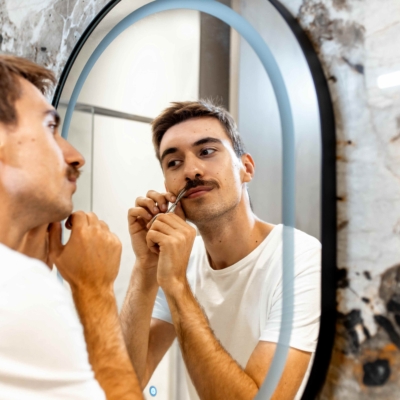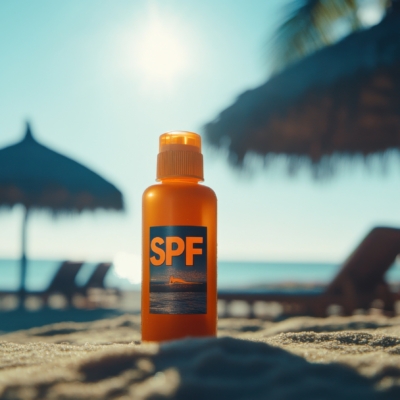
Sephora Vs. Ulta Beauty: Which Retailer Is Right For Mikayla Nogueira’s POV Beauty?
Ulta Beauty launched over 40 brands and Sephora launched 35 so far this year, but the beauty specialty retailers are duking it out to launch another big one: TikTok’s reigning beauty queen Mikayla Nogueira’s POV Beauty.
It’s not hard to understand why. According to reporting by the publication Puck News, POV Beauty hit the ground sprinting when it premiered online in March with five skin prep products priced from $22 to $38. It racked up about $1 million in sales during its first seven minutes and $3 million before inventory completely sold out.
More than 110,000 people signed up for the waitlist on POV’s restock in May. Once it went live, the $158 bundle containing the brand’s full assortment sold out in 30 minutes. POV Beauty is backed by Imaginary Ventures, the investment firm co-founded by Net-a-Porter founder Natalie Massenet with Skims, Kosas, Glossier, Westman Atelier, Half Magic, Reformation, Everlane, Nécessaire and Stripe in its portfolio.
A former Ulta store employee, Nogueira joined TikTok in 2020 and attracted 10 million followers in a year with her bold makeup looks. Her influence has only continued to explode since then. In 2022, Phlur sold out of a year’s worth of its $99 Missing Person fragrance in 10 minutes after Nogueira stitched a TikTok about it. Products from L’Oréal, E.l.f. Cosmetics, Glow Recipe, Basma Beauty and CTZN Cosmetics have gone viral after being spotlighted by the influencer.
Nogueira’s ties with Ulta remain strong. In April this year, she hosted the retailer’s first public-facing beauty convention, Ulta Beauty World. However, her connection with Sephora has been blossoming too. Last month, Sephora collaborated with POV Beauty to gift 50 of Nogueira’s followers $1,000 shopping sprees at the retailer’s Times Square location in New York City.
Coming off its largest North American launch to date with Hailey Bieber’s Rhode, which was estimated by analytics firm YipitData to have exceeded $10 million in retail sales in its first two days, Sephora is looking for its next big win. Meanwhile, Ulta is laser-focused on gaining back ground it lost in 2024 as it executes a turnaround plan partly centered on securing buzzy new brands.
As the battle for POV Beauty wages on behind closed doors, we decided to dig into what the brand’s approach to retail should be. For the latest edition of our ongoing series posing questions related to indie beauty, we asked nine retail consultants, content creators, marketers and investors the following questions: Do you think POV Beauty will launch at Ulta or Sephora, or should it pursue another distribution strategy altogether? What advice would you give the brand on its brick-and-mortar strategy?
- Tina Bou-Saba Founder, CXT Investments
This may be a controversial answer, but I am going to say neither. I really like Mikayla. She is relatable, funny, energetic and hardworking. It's been fun to watch her rise. She has real talent and a unique presence in the beauty space. I am happy to see her success.
No doubt there has been a lot going on behind the scenes, but I don't understand POV's launch strategy. It seems like they were trying to prove demand with a limited run of product earlier this year. But as we saw with Rhode and Kylie, beauty brands led by major influencers can generate tens of millions of dollars in sales online, with healthy profitability. While they may eventually opt to partner with a specialty retailer, they don't need that distribution to get to $50 million in sales.
Of course, that type of DTC-first strategy is generally limited to influencer brands that can truly capture the zeitgeist as I believe Mikayla can. This would allow the brand to drive significantly more consumer traction before it launches at retail, thereby creating more "pull" in-store.
In addition, I believe that it would be much more capital efficient to build a real DTC business first as cash flow generated from operations could fund all or part of the retail launch rather than requiring additional equity or debt financing. This, in turn, would create more value for Mikayla as a founder and owner.
I appreciate that the brand will likely get a great deal from whichever retail partner it chooses, but I still worry that it's too early. It feels like brand longevity would be better served by following a model akin to that of Rhode. Really build the demand before going big at retail.
- Karen Hayes Founder, Indie Global Strategies
On this one, I’m team Ulta though given Imaginary Ventures’ clear preference for Sephora and [POV Beauty CEO] Ani Hadjinian’s extensive Sephora track record, black and white seems a more likely outcome than orange. To be clear, POV Beauty will find success in either channel with the right strategy and investments.
I favor Ulta for two key reasons. First, the competitive landscape. POV’s skin-priming positioning faces less direct competition in its price range at Ulta. The primer subcategory there could use some disruption, and POV would enjoy a clearer path to win share of basket. Meanwhile, Sephora is densely populated with younger brands in this segment—Refy, Merit, Danessa Myricks, Kulfi and others—all vying for the same customer mindshare. From a product differentiation standpoint, there’s more white space at Ulta.
Second, audience alignment. Nogueira built her following on accessibility and relatability, the “everygirl” who worked at Ulta and loves a drugstore find as much as a prestige splurge. This gives her immediate credibility with Ulta’s PBAs, who will recognize one of their own and champion the brand accordingly. At Sephora, the sheer volume of celebrity and influencer-led launches means higher noise levels and more pressure to immediately prove differentiation.
Her audience skews toward value-conscious beauty enthusiasts who appreciate luxury but don’t exclusively shop prestige. Ulta’s high-low model mirrors this sensibility perfectly, whereas Sephora’s prestige-only positioning may create friction with POV’s core community values.
Nogueira’s followers will find her anywhere, but which retailer offers the best opportunity to expand beyond that base? POV would be a bigger fish in Ulta’s pond, with more shelf presence relative to competitors and more organic advocacy from store teams. That matters enormously for a brand that needs to convert curiosity into repeat purchase.
- Denise Gorant Fractional Marketing and Brand Consultant
I think POV Beauty will launch at Sephora rather than Ulta. Sephora has been aggressively pursuing creator brands and now influencer digital storefronts. POV fits squarely into that strategy. While Ulta’s broader customer base and mass-to-prestige positioning, plus some real opportunities to gain customers in the current prestige skin category, might ultimately drive stronger sell-through, Sephora offers more international reach (for the moment) and an elevated cachet that aligns with both the brand’s image and the aspirations of its followers.
The best brick-and-mortar strategy that I would advise for any brand comes down to representation and education. No one will protect your brand’s equity more than your own team. Retail partners like Sephora or Ulta are focused on driving overall sales, not on making sure POV’s gondola always looks flawless. That’s where education becomes critical.
I’d advise POV Beauty to leverage the same digital tools that built its community with beauty advisors through social media and mobile, using gamified learning and storytelling (think episodic posts) to arm them with product knowledge. Reward them, appreciate their support and encourage their fandom with gratis. It works to build connection and community in store. A well-trained, motivated advisor is the most powerful brand advocate you can have in-store if not your own.
-
POV Beauty is already rewriting the rules online, and the retail question is less about shelf space and more about story. Mikayla started as a beauty advisor at Ulta, helping everyday customers navigate aisles, swatching shades and make informed beauty choices.
Her outlet was filming makeup videos that sparked her career and built a huge community unlike anything the beauty industry had seen. Her influence helped some of the biggest brands today go viral and experience exponential growth.
Sephora is a powerful platform for a founder-led brand, no question, but Ulta offers a narrative that’s authentic and deeply resonant. It’s not just about which retailer sells more units, it’s about which one amplifies the brand’s origin and fuels the next chapter of growth. For POV Beauty, Ulta isn’t just a launch pad, it’s home.
To now see her brand take its place at Ulta would be a full-circle moment that connects her personal journey to the millions of shoppers who first discovered beauty the same way she did.
- Rachel Roberts Mattox Brand Developer and Founding Member, The Board
For me, the real question isn’t where POV Beauty should land, but rather why either retailer is so eager to win it, and what strategies they’ll employ to do so. The magic of POV Beauty isn’t in the formulas, which early reviews describe as mediocre and iterative, nor in its blah brand identity. What makes it compelling is Mikayla’s sheer power to drive sales velocity: $1 million in under 10 minutes. $3 million before a full sellout. That’s the kind of traction that retailers will chase, but does it warrant a long-term brick-and-mortar strategy?
Retailers are betting on Mikayla’s ability to drive foot traffic and generate sustained hype, but initial buzz is just one part of the equation. The real challenge lies in building out a compelling hero franchise, sustaining product innovation and, most critically, customer retention. Creator-led brands are uniquely vulnerable to the volatility of online culture. Mikayla has already weathered quite a bit of scrutiny, criticism and backlash. Will either retailer stand firm and support this brand through another storm?
In that context, Sephora may be better positioned to support POV Beauty’s high-risk, high-reward profile. Their new affiliate platform, My Sephora Storefront, and the recent giveaway with Mikayla, allegedly funded by Sephora, signal a strategic focus on Creator-backed brands. I wouldn’t be surprised if Sephora offered an unprecedented deal just to lock her in and validate its affiliate strategy.
That said, this launch may ultimately benefit the retailer more than it benefits Mikayla. Scaling a brand like this through traditional retail channels requires more than influence. It demands operational reinvention, a robust leadership team and the transformation of Mikayla’s personal brand from influencer to brand founder. The opportunity is real, but so is the risk.
- Jacob St. John Founder and CEO, Navigo Marketing
I think Sephora is the better fit for POV Beauty, especially given the recent success Rhode has had there and Sephora’s ability to confer prestige early in a brand’s lifecycle. That said, POV has a long road of brand building ahead. Many influencer-led launches burn bright initially, but struggle to extend beyond the creator’s own audience.
The lack of organic Amazon search volume despite their explosive DTC sales underscores this challenge. Current traction is highly tied to Mikayla’s fan base rather than a broader shopper audience.
My advice would be to leverage Sephora’s platform for credibility and education while investing heavily in building awareness and demand outside of her sphere of influence before scaling into additional retail channels.
- Jen Garancheski Content Creator, Jen Luv
In closely watching the beauty space, I do think Mikayla will launch POV in retail within the next year, specifically at Ulta Beauty. Mikayla has a long connection with Ulta including her "origin story" of working for Ulta when her TikTok account took off in 2020. She was also a host at Ulta Beauty World in spring of 2025.
POV’s next big test is whether customers keep repurchasing. If those numbers come in, that could be the key metric as to whether or not the brand is ready for retail expansion. That being said, if they do expand to Ulta, I can see them choosing an over-reliance on Mikayla’s persona as the driving force of the brand. This could alienate customers who don't know who she is.
In order to truly succeed, POV will have to present themselves as the providers of high-quality, effective products that stand out in the market with Mikayla's influence as a support system, not their entire strategy. The products need to extend beyond Mikayla with excellent performance or excellent marketing, ideally both. She would be smart to learn from the mistakes of Jaclyn Cosmetics as not to take the same route.
- Sarah Broyd Partner, Clarkson Consulting
Mikayla Nogueira is leveraging her strong social media presence, which grew out of a passion for skincare, approachability and candidness, to capitalize on key consumer trends with her new line of beauty products. The brand leans into approachable, high-quality products at a mid-range price point, appealing to consumers looking for effective products at accessible prices.
She’s also filling a void that came from her own experience in retail beauty, where people didn’t know how to prep their skin prior to makeup. POV Beauty’s clean packaging and product formulations align perfectly with growing consumer expectations of "clean beauty," which is positioning the brand well for long-term success in brick-and-mortar stores.
Mikayla used to work at Ulta as a store associate and continues hosting Ulta events, along with Ulta hauls on her social media platforms. It seems to me like Sephora would need to have a very compelling offer to pull her away, but would that be the right thing for POV or Sephora? I don’t think so.
POV plays perfectly into Ulta’s portfolio, especially given Mikayla’s personal background and experience as an Ulta associate. The retailer’s target audience is open to new trends, innovative formulas, and influencer-driven brands, which aligns directly with POV Beauty’s product philosophy. Having previously worked at Ulta gives Mikayla a leg up in understanding shopper behavior, and she can use this to maximize on her launch of the product.
Her products are competitively priced for the overall beauty market, but would be a lower price point than the average Sephora product, which tends to focus on more prestige brands. POV Beauty’s products and price points suggest the target audience is a younger, trend-focused consumer who is comfortable experimenting with new products but still seeking value.
POV Beauty’s price point is around the mid-range cost that Ulta typically aims for in their accessible, but premium-type products. While both Sephora and Ulta target similar age ranges of consumers and recognize the growing level of influence that gen Z has, Ulta tends to have a broader appeal, with a stronger focus on early engagement in beauty.
As she continues to grow her line, Mikayla should ensure the organization is stable enough to launch in retail. Buzz and popularity for products doesn’t always translate to retail if inventory isn’t properly managed, among other factors. While POV Beauty reportedly did $1 million in sales during the first seven minutes of its online launch, selling out after reaching nearly $3 million in sales, it doesn’t guarantee a similar outcome for an in-store launch without a strategic plan in place.
Starting with a smaller launch to avoid under or overstocking will help predict future demand and create consistency for the consumer. Leveraging strong brand recognition and authentic storytelling from Mikayla’s personal experience as a former Ulta employee, POV Beauty should be positioned well to drive traction and foot traffic at the stores. However, to create longevity in the line, POV Beauty should start to think about thoughtful product expansion now to ensure sustainable retail growth in the future.
- Sonia Elyss Beauty Marketing Consultant and Creator Mentor, Lipservice World
I think POV Beauty will launch at Ulta, at least they better, given Mikayla's strong ties to the retailer and her community's devotion to her "come up" story. The nature of a full-circle moment for her to launch there just makes sense.
Additionally, I think if Mikayla launched at Sephora, she might actually experience a bit of backlash from her community as though she is "too good" for Sephora. Although we know from a business perspective this has nothing to do with what the brand selects, the perspective of her audience might not be so understanding.
When it comes to a brick-and-mortar strategy, my advice would be to launch pop-ups in key underserved suburban neighborhoods. While opening a flagship store or doing pop ups in major cities might seem exciting, I think the real consumer opportunity will be at college campuses and strip malls.
Not only will the real estate be less expensive, but the marketing concept of focusing on locations in the U.S. that feel overlooked will resonate with her audience. At this stage in the business, the POV Beauty customer is the Mikayla audience, making sure they feel seen and heard should be the top priority.
If you have a question you'd like Beauty Independent to ask retail consultants, content creators, marketers and investors, send it to editor@beautyindependent.com.





